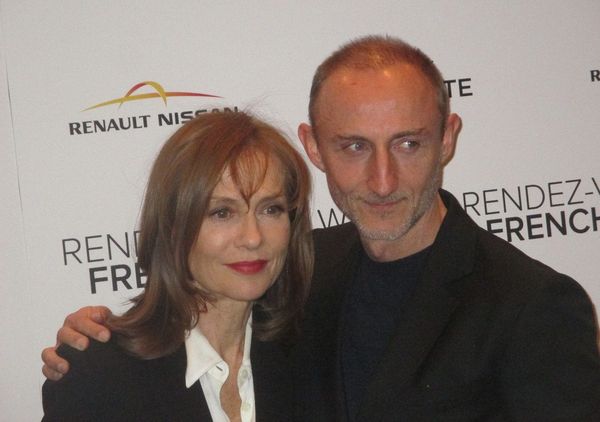 |
| Guillaume Nicloux and Isabelle Huppert at the Valley of Love premiere Photo: Anne-Katrin Titze |
John Waters, Cindy Sherman, James Ivory, Angélique Kidjo, Emmanuel Finkiel (Je Ne Suis Pas Un salaud), Deniz Gamze Ergüven's Mustang co-writer Alice Winocour (Disorder), Nicolas Pariser and his star Melvil Poupaud (Le Grand Jeu) and Bang Gang (Une Histoire D'Amour Moderne) director Eva Husson joined Guillaume Nicloux and Isabelle Huppert on the red carpet.
The Kidnapping of Michel Houellebecq, Alfred Hitchcock casting James Bond Sean Connery for Marnie, Gianfranco Rosi's Sacro Gra and The End with Gérard Depardieu, came up in my conversation with the Rendez-Vous with French Cinema opening night film director, Guillaume Nicloux.
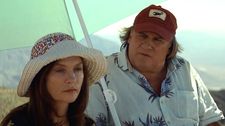 |
| Isabelle Huppert and Gérard Depardieu in Valley Of Love |
A long divorced couple, played by Depardieu and Huppert, meet up in Death Valley after their son committed suicide months earlier. They each received a letter promising them that if they followed instructions and visited specific spots in the American desert, their son would appear to them. Nicloux nimbly gives his audience plenty of room to reflect on the seen and unseen and to provide reference points beyond the screen in Valley Of Love.
Anne-Katrin Titze: The combination of your last two films makes for a good Möbius strip. The Kidnapping Of Michel Houellebecq, which is a documentary but not a documentary, and here you have a fiction film which is not completely fiction about the re-connecting of two people, Isabelle Huppert and Gérard Depardieu.
Guillaume Nicloux: Over the past five, six years I have decided to move towards a much more introspective kind of storytelling where I mix my intimacy - wherever it goes on inside - with the filmmaking process. Indeed, Michel Houellebecq is a personal friend and so is Gérard Depardieu. So their own inner lives also go into my movies. Actually, I shot another movie this past summer also with Gérard Depardieu which is even more introspective, even more connected with what was going on in my own life. Indeed, what I show in that movie is a dream I had and I asked Gérard to play myself in the way I was in that dream. The title is The End and it premiered at the Berlin Film Festival last month.
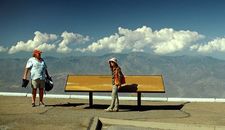 |
| Guillaume Nicloux: "Sometimes questions are more interesting than answers." |
AKT: I see a lot of links to Valley Of Love where dreams are of immense importance. They are quite terrifying. Were these actual nightmares of yours? Somebody grabbing your legs accompanied by a strange smell?
GN: Actually, it's a very particular story because I myself was visiting Death Valley two years ago. In the same canyon where Gérard's character saw his son, I myself had an experience where I saw my father who had passed away four years prior to that. Again there is an interaction between my films and my reality. And to continue with the Mise en abyme, there is another transfer component. I had him see the son, while I saw my father. Gérard Depardieu himself lost a son whose name was Guilllaume, just like me.
The roles were reversed and there was a cycle between the three of us and the parallel experiences. So it wasn't a nightmare as such in that case but it's real life inside the cinema and fiction becoming life and life becoming fiction in this paradoxical type situation in which cinema is the only medium where you are supposed to tell lies in a very truthful way. So the truth becomes a lie which is truthful.
AKT: Cinema does that in manifold form. I was thinking, for example, of Hitchcock casting Sean Connery in Marnie as a rapist. He could get away with it because of Sean Connery's James Bond-ish past roles in cinema. Your film points us clearly towards capabilities of cinema.
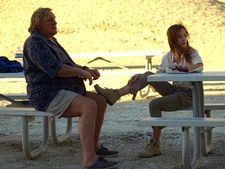 |
| Gérard Depardieu Isabelle Huppert: "A lot of things that are not visible to the eyes exist factually …" |
GN: Yes. It is even more shocking in my last movie, The End, because there is a closer connection with my unconscious life in terms of what desire is. In this respect it's interesting that you brought up Marnie. For this last movie, I really waited to free myself of all limitations usually entailed by self-censorship because i wanted to have a more straightforward access to desire as such without being caged in by the usual conceits of storytelling. I wanted for it to be more sincere. You can actually read me through myself played by Gérard Depardieu. My relationship with death and sex there [in The End] is much more frontal than it has ever been in my previous films.
AKT: There are a few moments in Valley Of Love when I felt I was seeing the truth. I don't know myself exactly what I mean by that. One of them was the girl on the tennis court explaining herself and to Gérard Depardieu very matter-of-factly that life is too much. I don't know why I thought she was the truth. Is she the one identified as la mort in the end credits?
GN: You have the answer.
AKT: I have the answer? Death is truth?
 |
| Valley Of Love: "I try not to pre-visualise it, not do rehearsals with actors." |
GN: Yes, maybe. Sometimes questions are more interesting than answers. What matters is whatever answer you give. You can believe that the son was just a ghost or an object of man's imagination or you can also believe that he truly existed. The brain is capable of a lot. It's a cluster of chemical reactions that can allow us to show what is not visible to the eyes. A lot of things that are not visible to the eyes exist factually - think about ultrasound or UV rays.
I am not somebody who has esoteric beliefs but I do believe that states of mind we find ourselves in in certain times of our lives, also in some specific places, can generate reactions that could be conceived as caused by hallucinogenic substances. But you don't need those. they are just generated by the conditions. So I can't really give you an answer because you've given the answer to yourself.
AKT: I wrote down a few lines. Gérard Depardieu says at one point "People change partners but they stay the same." And Isabelle counters him by saying, no, no, people do change. I spoke with Isabelle yesterday about how this change is even reflected in her costumes. She looks different before and after he arrives. Do you want to comment how you were working with costumes and their journey?
GN: Since I first started in my filmmaking career, I explored lots of different genres. I was trying to find my own way, trying to be as sincere as I could be within the fictional type of work. Having said that, for the last four or five films, I completely changed the way I approach filmmaking. It has changed me as well. In the past, I was always very obsessive about my costume choices, about my set decor choices. I was really hands-on and involved. Now, I've been trying to completely detach myself from that. I try not to pre-visualise it, not do rehearsals with actors. I don't read through lines with them, I don't talk to them because I don't care. I'm not interested. What I'm interested in are people.
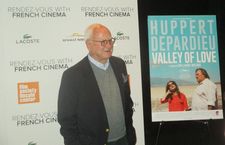 |
| James Ivory on the Valley Of Love red carpet Photo: Anne-Katrin Titze |
I don't work with actors, I work with people, with who they are as human beings. Paradoxically, I would even allow them to choose their own costumes for them to be who they are. I have been trying to be more hands-off and relaxed, "cool", completely detached because for too long I had been overly attached to that kind of control over my characters. When someone starts an analysis, they are very excited about what they find out about themselves. I've gone through different ways of being and they are all true, they are all who I am. This connects to that line that you mentioned. You can be always the same person but I've had different incarnations of myself through time, though at the same time I am myself.
AKT: So it was them also getting closer to each other through costumes, to get back to that for a second. Did you see Gianfranco Rosi's Sacro Gra? In that film there is a scientist who records the sound of palm trees. I got the same feeling in Valley of Love, as if I could hear the palm trees.
GN: I have not seen it. In regards to the palm trees, there is a moment where Gérard Depardieu looks at the trees. There was a moment Gérard actually started crying, generating tears himself. The reason was that he was so moved by the shape of the bark of the palm trees. He explained at the time that to him it looked like a puzzle and it seemed to signify destiny in life and different twists and turns and how they match.
AKT: At the very beginning the color of the palm trees matches Isabelle's hair. Did the dog's head enter the film early on? Was it added to the story?
 |
| Gérard Depardieu's pineapple shirt with Isabelle Huppert overlooking Death Valley |
GN: My movies are always very scripted. In this particular movie, there was virtually no improvisation. The only thing I added while shooting was that Death girl scene that you mentioned earlier. That was a young lady I met in a bar while I was shooting. She was working there. That's what I mean by adding life to my films. The dog's head was scripted from the very beginning.
AKT: "You can only hate an ex, you never really loved." I totally agree.
GN: I do believe that when we've loved somebody very intensely, we continue loving that person throughout all our life. That's how we realize that people we allowed inside ourselves can never actually leave us.
AKT: I quoted the same line to Isabelle, and she also immediately agreed that for her that is true.
GN: It proves that love is actually the strongest feeling because rage ends up dying. We can not spend out entire lives being enraged with somebody else whereas with love, it's eternal. Having said that, for you to love somebody for an entire life you have to have been separated at some point and then realised how much you loved that person. It's after you are separated that you go back to loving that person even more. People change and the separation allows you to realise how deep the feeling was. It's tragic but good at the same time. It's even fantastic if you think of it in its harshness.
AKT: It can also work the other way around. That you realise after a separation that you didn't really love whom you thought you loved.
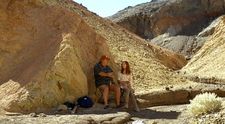 |
| Gérard Depardieu - Isabelle Huppert in Death Valley: "I myself had an experience where I saw my father…" |
GN: That's true. I'm still thinking about what we were saying earlier. The only way of saving us when one loses somebody beloved is to resign ourselves to accepting that you will continue loving that person throughout your whole life and that that person will be with you throughout your whole life. Because the desire will always be there. The only other option is a will to forget the person and that will is more painful than the actual desire. The only way out is actually accepting the desire, realising that we don't have power over it. Once we do accept it, that stays with us.
AKT: I am having quite an afternoon. Before meeting with you, Melvil Poupaud told me that Jacques Lacan was in love with his mother. I never expected to talk about so much desire.
GN: It's because with desire, nobody can explain it. That's why it's so important. It's the most important thing in life.
AKT: And you make films about desire?
GN: Undoubtedly because I try to put my own desire into images. Sometimes it's complicated and contradictory. Because we are complicated.
Read John Waters on Isabelle Huppert and Isabelle Huppert on John Waters and Valley Of Love.
Coming up, more with Isabelle Huppert.
Valley Of Love opens in the US on March 25.





















